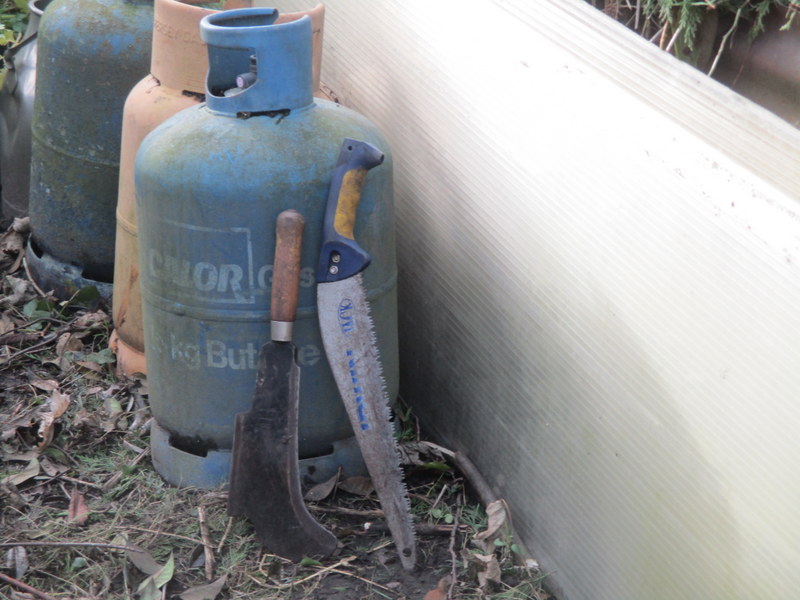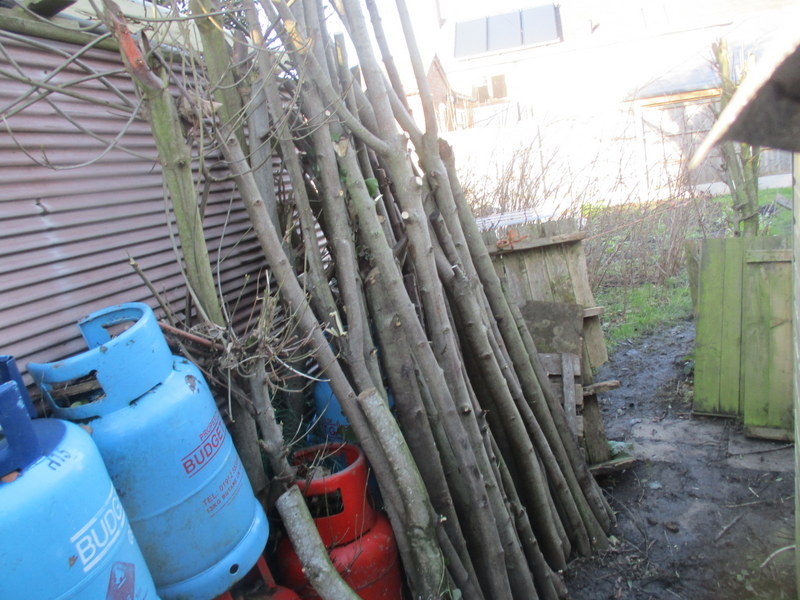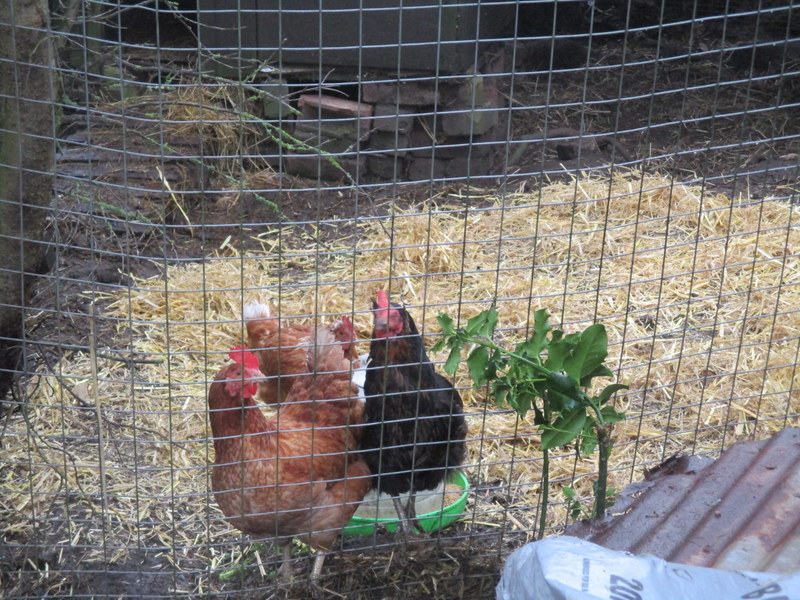'Individually yours ---- '
With 'semi-hibernation' rest time coming to a close, now in late January is the time to begin the next eco micro-holding cycle, here in the UK midlands, Some seeds such as celery, lettuce, onions and tomatoes have already been sown in pots now sitting on top of the Welsh dresser in the warm living room. As these seeds germinate, (there's a bit of magic?) they'll need to move into the light-filled conservatory, otherwise without the light, the new embryo plants will become too 'straggly' and 'leggy'. Generally they go under a bubble-wrap plastic tent in the conservatory which protects them from over-cold conditions, but if it gets real cold, they then get the benefit of some heat from a small hurricane-type paraffin lamp. Broad bean seed will shortly need to be sown in a clump under some glass in the veg patch, the glass being already in place to keep that spot a bit less cold, to be then planted out as plants in March.
This year a variety that can be sown in early spring to then give beans as virtually as early as autumn-sown seed was advertised in the seed catalogue, and taken advantage of. The problem with autumn sown crops is that if there's a bit of a severe winter , the plants can get wasted, so this method is handy as there's generally no wastage. There are several 'pluses' to getting the beans early : the crop comes in a 'hungry gap' early period when not a lot else is available, an early crop virtually guarantees no black fly attack, and the ground is then released after the bean crop relatively early so another crop, say, winter greens crop such as curly kale, can be grown after the beans.
'Log - on -- '
And still, of course, getting the advantages of delicious produce, the surplus of which can easily be frozen, plus plenty of material in the form of stalks and bean haulms for the compost heap, and also fertilisation of the soil itself via the nitrogen taken out of the air by the plants and stored in nodules at the roots (more magic?) (when the crop has finished the stalks need to be cut off at ground level rather than pulled up, so that the nitrogen then has time to be released into the soil). The stack of 'extra' loppings has finally been tackled, a bit later than planned, but hey, better later than never ---
It'll take awhile to work through it, but no rush, and it looks as though a fair bit of burning wood will result from the work - 'killing two birds with one stone' - crikey, that must be an ancient expression? The tools to do the processing of the loppings are the billhook and the pruning saw, a handy instrument only a third of a metre long but very effective - in fact it's a useful tool in many situations, such as, say, sawing 'small' wood , and including, well, use for pruning -----
'Sparse produce --- '
Aggie, Beattie and Blackie have at last decided to have a break from egg laying - they've been hard at it continously for over two years. but will they come back in lay- ? Chickens used to lay for, say, nearly a year, have around a two month 'lay off' period, then come back into lay, but perhaps the modern variety is bred to do one stretch of two years - ? Time will tell ---- In terms of micro-holding produce, it's a limited supply at this time of year, with potatoes and apples having run out, the last of the celery just having been dug up and limited winter greens on offer - the purple sprouting not having yet sprouted. There are still some beetroot in soil in a bucket, having done pretty well this year, and there are a few leeks down in the paddock glasshouse yet to use - the main bed was decimated by the alium fly.
This pest has mean't that a change in plan for both onion and leek growing has to take place. In terms of onions it's the onion sets ('baby' onions) that seeems to have taken the main hit, the onions grown via own seedlings, being that bit later, seem to have escaped the ravages of the alium fly, so that seems to be the way to go, and/or plant out the onion sets later to try to miss the fly. Leeks will be grown in smaller beds in different locations in the veg patch in the hope that some might escape predation, as has happened by accident before, plus as this year, some will be grown in the glass house. Again, time will tell ----
'Individuality v. society ----- '
In some cultures, generally those of an autocratic, one party style, individualism is generally not exactly encouraged, with the collective state being all important. At the other end of the scale are the western-style democratic societies with individual rights and freedoms built-in to their constitutions, and in which people react at times pretty strongly to any prospect of any perceived 'over' central state control. The business of the UK leaving the EU is probably at least partly to do with the sovereign country of the UK being subsumed into a giant one-nation power-block of the United States of Europe, the threats (to democracy) of which writers such as Huxley and Orwell were warning against some years ago. To some, it would seem to make some sense for the EU to be 'what it said on the tin', i.e. to be a community, coming together for mutually beneficial matters such as defence and trade, but at the same time retaining bio-diverse national identity and independence.
The same 'bio-diverse' approach can be taken to the question of 'society v individualism', in that there is a good case to be made that good, developed 'bio-diverse individuals will likely then make a good society, but that also there are society needs that exist alongside individual needs. An example of such a relationship occured in the second world war here in the UK, which acted as a traditional democracy, with the basic notion that within sensible social and legal limits, it was up to the individual to get on and lead their own lives. Then in wartime emergency conditions, it was deemed that society needs were more immediate than those of individuals, so individuals had to join the fighting forces to defend their country. Food supplies were problematic, so again due to the emergency conditions, individual rights were suspended and society's need took precedence.
Individual farmers, for instance, could no longer decide on their own production patterns, a body called the 'War Ag' now directing farmers in terms, for instance, of the area devoted to cereals individual farmers had to grow. This was a measure introduced due to emergency national conditions, and when the emergency eventually ceased, the situation then reverted to individuals having the power to decide, within social and legal limits, their own lifestyle conditions. In other words, the two sets of needs, individual and society's, co-exist and the priorities are set according to the prevailing (dynamic) conditions. An interesting question in modern times in, for instance, the UK, is whether individual needs priorities aren't set over strongly, via the modern 'free market' impetus, with by default then under prioritising of social needs, resulting in the risk that some individuals - and commercial firms (in terms of, say, for instance, tax avoidance) - might then feel that they should be unconstrained by social influences - ? Here in the UK the two main and relevant political parties seem to be somewhat polarised at either end of this particular continuum, which doesn't seem at times to be of too much help ----
'Small may be yet beautiful --- ?'
'Work out your own salvation. Do not depend on others. (Buddha)
In societies which enshrine individual rights in their constitutions, should though the individual then be a key unit - ? Maybe this is what Fritz Schumacher was thinking of when he wrote his well-known work Small is Beautiful, and within it wrote :
'In an age of 'Giantism', it's necessary therefore to insist on the attributes of 'small''
In, though, an age of 'large', has, as some writers such as Steven Levine ( A Gradual Awakening) and Michael Foley (The Age of Absurdity) suggested, the individual lost power, inhibited by the sometimes bullying-type 'big is best' behaviour of large commercial organisations, and, at times, government. Individuals, according to Levine, have been 'conditioned' out of their own independence and strength, by the seemingly ever-increasing amount of 'large-scale' outfits ranging against them, and a 'big is best' mindset fixed within such a culture, then putting power-less individuals in a position the exact opposite to that which should be the case, i.e. instead of being an important element, or even the most important element, they've now become the powerless entity at the bottom of the pile - ? (the 'prey' in the 'large predator' sea?) Could this in fact be one of the base faultlines of modern culture - ? (and the increased use of court gagging orders in the UK has been recently cited, for instance, as an example of erosion of one of the key elements of individual rights, free speech).
'Nanny governments --- ?'
The question as to how far should society's controlling organisation, government, 'intervene' in the lives of individuals is another area of interest to explore. Such a question is probably partly answered in the discussion above, in that in times of national emergency the state takes a control 'for the good of all', but then hands back the reins when the emergency's over. Then , though, the question becomes : who's responsible for the adult person's life (i.e. in non-emergency times)? Such appears to be the 'micro management' approach of government currently in the UK, that it appears to be the government which wants/needs such control (the need for power and control is generally driven by ideology and /or insecurity - ?).
The big snag to this situation, certainly for 'freerangers', is that with government taking the 'responsible adult' role, there's less room for individuals to take such a needed role for themselves, which then can impede fuller development of people - ? It also has the effect of influencing people to become 'externally directed' - and no doubt this directly affects younger generations? - rather than trusting their own innate being and development, which could link to Levine's comment re. people being conditioned out of their own strength-?
'Freeange rescue ---- ?'
Maybe this too is a key faultline to modern-day life, one which maybe contributing to the reported modern-day 'angst' amongst people ---- (and to become a self-motivated and directed 'freeranger' could then be a healthy route to take-?) It could also be a driver, for instance, of the move of the UK to come out of the large, 'parental'-type organisation that is the EC - ? Maybe it is better to let people largely lead their own 'imperfect' lives, to make their own mistakes from which they can learn, to gain their own successes, learn from their failures, to then gain the inner strength to develop deeply and fully - ? And, to allow 'natural processes, such as, say, the more experienced to counsel the less experienced, which in modern 'youngist'-type culture may be something of a missing link - ?
It's been stated that the way to get a good, developed, responsible and mature society is to fill it wth good responsible, mature people, in which case the individual is again important, as is their development. Even though Abraham Maslow's researches amongst such well-developed people were done some decades ago, his 'hierarchy of human needs' model is still considered as a useful guide to them and to the dynamics at work amongst them, The 'base' layers of needs relate to the individual's survival and security, but then there's more focus on layers of social needs including 'social contribution' and 'social esteem', with then fuller personal development to 'full self actualisation' levels - the 'max development' level of the individual - at the top of the hierarchy. Maslow's statement is then of a variety of need levels, which include again both individual and social based needs, again re-emphasising the need to achieve balance between these two important sets of needs, a balance which will likely be ever changing due to changing dynamic conditions.
Micro-holding bio-diversity -----
The mini-society here at the micro-holding is also bio-diverse, consisting ot two humans, one cat, three chickens and a multitude of birds, all of whom co-exist in reasonable harmony, apart from when 'gorgeous girl' Tia the cat is having her long hair brushed which makes her squeak a bit - it's a 'love/hate' thing with her -- It's cold and frosty weather here now at the end of January, so the social emphasis and priority is on the birds, those tough little 'freerangers' who exist in the cold and without central heating --- The gang of sparrows live in the dense ivy creeper on the cottage wall and seem to do ok. Not exactly sure where the blackbirds quarters are, but it's not uncommon in cold weather to see six or seven male blackbirds co-existing and feeding on the put-out grain and bread on the driveway.
There's more bird feed in the upright feeders, next to the driveway, and down in the retreat paddock. The micro-holding area has considerably more vegetation than the neighbouring gardens, so holds more birds, so it's important to give them some supplementary feed when the going gets tough. The animal that's man taking socially compassionate action towards the bird animals, as no doubt occurs in many locations accross the UK -- and accross the globe.
'King Arthur ---- '
Like too the Swedish world adventure race team leader, good man, who took pity on 'Arthur', a damaged and mis-treated stray dog, but nevertheless of considerable 'presence', who attached himself to this adventure team (and who finished this gruelling six-day event through Ecuador's jungle regions with the team). In spite of years of seeming mistreatment at the hands of uncaring humans (there's apparently no mainstream tradition of dog care and compassion in Ecuador), Arthur proves to be an ultra resilient and ultra loyal character, as the team leader found out after overcoming many difficulties and getting Arthur back to his home in Sweden, supported brilliantly by the Swedish public and media, as well as world media - a cracking good book to read ( Arthur by Mikael Lindnord ), to give some much needed uplift in these unsettling times ----




Comments
0 responses